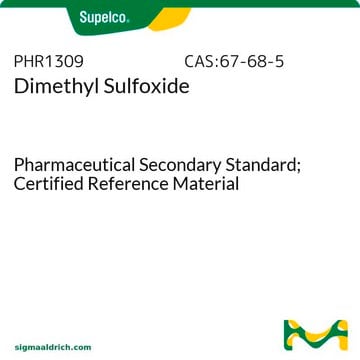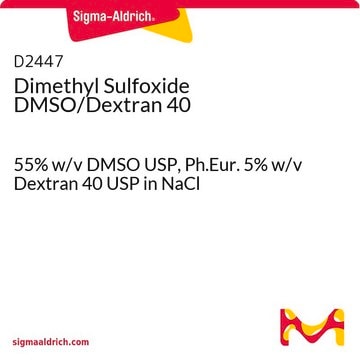D2050000
Dimethyl sulfoxide
European Pharmacopoeia (EP) Reference Standard
Synonym(s):
DMSO
About This Item
Recommended Products
grade
pharmaceutical primary standard
vapor density
2.7 (vs air)
vapor pressure
0.42 mmHg ( 20 °C)
autoignition temp.
573 °F
expl. lim.
42 %, 63 °F
manufacturer/tradename
EDQM
availability
not available in (Sales restrictions may apply)
refractive index
n20/D 1.479 (lit.)
bp
189 °C (lit.)
mp
16-19 °C (lit.)
density
1.10 g/mL (lit.)
application(s)
pharmaceutical (small molecule)
format
neat
storage temp.
2-8°C
SMILES string
CS(C)=O
InChI
1S/C2H6OS/c1-4(2)3/h1-2H3
InChI key
IAZDPXIOMUYVGZ-UHFFFAOYSA-N
Looking for similar products? Visit Product Comparison Guide
General description
Application
Packaging
Caution
Other Notes
related product
Storage Class Code
10 - Combustible liquids
WGK
WGK 1
Flash Point(F)
188.6 °F - closed cup
Flash Point(C)
87 °C - closed cup
Choose from one of the most recent versions:
Certificates of Analysis (COA)
Sorry, we don't have COAs for this product available online at this time.
If you need assistance, please contact Customer Support.
Already Own This Product?
Find documentation for the products that you have recently purchased in the Document Library.
Customers Also Viewed
Our team of scientists has experience in all areas of research including Life Science, Material Science, Chemical Synthesis, Chromatography, Analytical and many others.
Contact Technical Service

